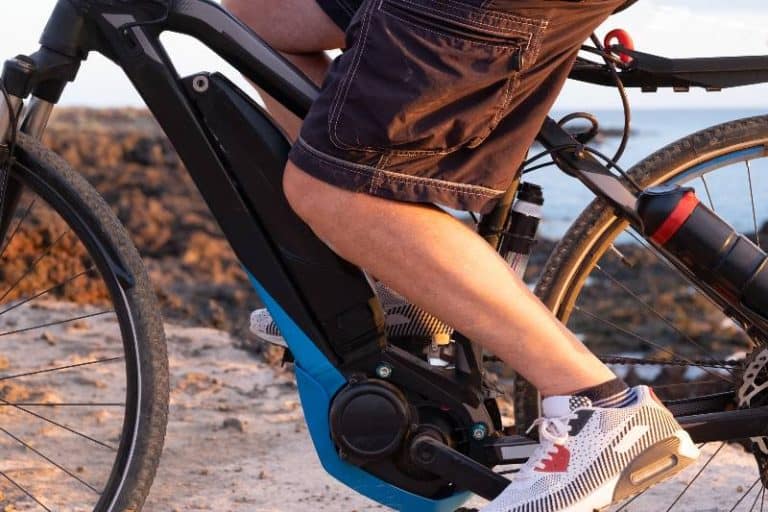How Much Does an E-bike Weigh? How to Choose the Right One
Electric bikes are becoming more and more popular every day. But with all of the different types and brands on the market, it can be tough to figure out which one is right for you. In this blog post, we will discuss, how much does an e-bike weigh and how to choose the right one for your needs!
While electric bikes can vary widely in terms of weight, most e bikes weigh between 40 and 80 pounds. Of course, the weight of an e bike also depends on the materials from which it’s made.
Key Takeaways
- E-bikes typically weigh between 40 and 80 pounds. But the precise weight of an e-bike varies depending on the type of bike, the size of the battery and motor, and the materials employed.
- You will probably need to spend more money if you want an e-bike that is both lightweight and effective. This is so because better-quality materials and components are typically used in lightweight motorcycles.
- If you want to use your e-bike for long-distance travel or competition, the cost can be justified.

Is E-bike Weight Important?
When it comes to electric bikes, weight is a crucial factor to consider. Your bike’s speed, range, and maneuverability can all be affected by your weight. That’s why it’s important to do some research before making a purchase. The good news is that there are electric bikes available for all different types of riders. Whether you’re looking for a lighter frame materials, or option for racing or a heavier-duty bike for trail riding, there’s sure to be an electric bike that’s perfect for you. So don’t let weight hold you back from getting out and enjoying the Ride of your life.
How Much Does A Good E-Bike Weigh?
Most e-bikes weigh between 40 to 80 pounds. However, the exact weight of an e-bike depends on several factors, including the kind of bike, the size of the battery and motor, and the materials used. For example, a heavy-duty bike designed for off-road use will typically weigh more than a lightweight e-bike designed for commuting. Similarly, an e-bike with a large battery and motor will usually be heavier than an e-bike with a smaller battery and motor.
Lighter or Heavier: Which Is Better?
Debates in the e-bike community about which is better: a lighter bike or a heavier bike. The debate generally boils down to two main arguments: that a lightweight bike is more expensive and that a heavier bike has a less powerful engine. There are some merits to both arguments, but ultimately it comes down to personal preference.
If you are looking for an e-bike that is lightweight and efficient, then you will likely have to pay more money for it. This is because lighter bikes generally use higher-quality materials and components. However, the price tag may be worth it if you plan on using your e-bike for long-distance travel or racing.
On the other hand, if you are more concerned with power than weight, then a heavier bike may be a better option for you. These bikes typically have bigger engines, which means they can go faster and climb hills more easily. Of course, the trade-off is that these bikes can be more difficult to maneuver and require more effort to pedal. Ultimately, the decision of whether to buy a lighter or heavier e-bike depends on your own needs and preferences.
Ebike’s Weight Based on Types
Racing Type
Racing bikes are designed for speed and agility. They are usually lightweight, with thin wheels and frames that allow cyclists to pedal quickly. The handlebars are also narrower than on other types of bicycles, which can help cyclists navigate tight turns.
Racing bikes are one of the most expensive types of bicycles, but they can be worth the investment for serious cyclists. The low weight and quick responsiveness of these bikes can give riders an advantage on the race track or during a competition. For casual cyclists, however, a racing bike may not be worth the high price tag. But if you’re looking for a fast and nimble bike that can help you win races, a racing bike is worth considering.
Comfort Type
Comfort ebikes are a type of electric bicycles that is designed for riders who want a leisurely ride. These bikes typically have a step-through frame, which makes it easy to get on and off the bike. They also have extended handlebars that allow you to sit upright, instead of hunched over like you would on a racing bike.
This makes them more comfortable to ride, and they also tend to be heavier than other types of electric bikes. Comfort e-bikes usually weigh between 50 and 70 pounds, and they are often used for rides around town or on trails. If you’re looking for an electric bike that you can use for casual riding, then a comfortable bike might be right for you.
Is Extra Weight an Important Concern?
When it comes to choosing an e-bike, weight is often a primary consideration. After all, no one wants to purchase a bike that is difficult to transport or manage. However, it is important to keep in mind that the weight of an e-bike is not always indicative of quality. Many of the lightest e-bikes on the market are just as durable and functional as their heavier counterparts.
The key is to identify the primary motivations behind your consideration of purchasing an e-bike. If you are primarily concerned with commute times, then the added weight of an e-bike may be worth the tradeoff for the increased speed and efficiency. However, if you are seeking an e-bike for leisurely rides around town, then a lighter model may be ideal.
What Affects the Weight of Electric Bikes?
The weight of an electric bike has several contributing factors. The most obvious is the battery. Batteries can range in size from small, lightweight models to bulky, heavy-duty options. The size and type of battery you choose will have a big impact on the weight of your electric bike. In addition, electric bikes typically have a heavier frame than regular bikes.
This is necessary to accommodate the battery and motor. Finally, electric bikes often come with a range of accessories, such as lights, racks, and fenders. These can add significant weight to the bike. When choosing an electric bike, be sure to consider how much it will weigh with all of its accessories. Otherwise, you may end up with a bike that’s too heavy to be practical.
Does the Extra Weight of an E-bike Affect Your Ride?
While electric motorcycles have many advantages, one potential downside is their weight. E-bikes typically weigh between 50 and 100 pounds more than traditional motorcycles. This extra weight can impact the ride in a few different ways.
First, it can make the bike harder to maneuver, particularly at low speeds. Second, the extra weight puts additional strain on the brakes and gears, which can lead to premature wear. And finally, the battery life may be reduced if the bike is carrying a heavier load. For these reasons, it’s important to consider the weight limit when choosing an e-bike. If you frequently exceed the suggested weight limit, you may want to opt for a traditional motorcycle instead.
Average Weights of Different Types of Electric Bikes
Commuting E-bike
Electric bikes are becoming increasingly popular, as they offer a convenient way to travel short distances without the hassle of pedaling. But with so many different types of electric bikes on the market, it can be hard to know which one is right for you. One important factor to consider is the weight of the bike.
On average, commuter are also comfort electric bikes, they weigh about 50-70 pounds, making them heavier than both mountain and road bikes. This is because they have larger batteries, which are necessary for longer trips. However, the extra weight is worth it for the convenience and ease of use that commuter bikes provide.
Additionally, because this is made for commuting, these types of bikes can commute long distances.
Whether you’re running errands around town or commuting to work, a commuter bike is a great option for anyone looking for an easy way to get around.
Racing E-bike
Racing bikes are not only the most pricey but also the most lightweight electric bike varieties, often weighing about 40 pounds. They are constructed with very thin wheels, frames, and handlebars to enable you to cycle as quickly as you can.
These features, however, make them less durable than other electric bike types and more susceptible to breakage and flats. If you are looking for an e-bike to race with or for commuting over long distances, a racing bike is a good option. Just be prepared to invest in maintenance and repairs.
Mountain E-bike
Mountain e-bikes are among the most prevalent varieties of electric bikes, and they are made for both on- and off-road use. These bikes are anticipated to be fairly heavy, weighing somewhere between 40 and 70 pounds.
Additionally, the suspension on a mountain bike can generate up to 750W of power, which can help to lessen the impact of bumps. Mountain e-bikes can be a great option for those who want a versatile bike that can handle a variety of terrain. However, keep in mind that these bikes may be more difficult to transport due to their weight.
Cruising E-Bike
Cruiser bikes are the heaviest type of electric moto bike, weighing in at about 70 pounds. They’re called cruisers because they’re meant for leisurely riding, with features like large, comfortable seats and wide handlebars. If you’re looking for an e-bike to use around town or on easy trails, a cruiser is a good option. But if you need a lighter bike for more challenging rides, you might want to consider another type of bike.
Road E-Bike
Most of electric bikes weigh between 30 and 60 pounds, although some can weigh more or less depending on the specific model. For example, road bikes are made for off-road, challenging terrain use, including on sand or snow, similar to electric mountain bikes. Fat tire bikes often weigh between 60 and 80 pounds due to their bigger tires.
On the other hand, mini folding bikes or folding bikes are typically lighter because they are designed to be easily transported and stored. Ultimately, the weight of an electric bike will depend on its specific design and intended use.
Folding E-Bike
When it comes to hybrid electric bikes, there is a lot of variation in terms of weight. Folding electric bikes tend to be the lightest, as they are designed to be portable and easy to store. These bikes typically weigh in at around 27 pounds. Standard electric bikes are a bit heavier, typically weighing in at around 35 pounds.
However, some heavier-duty electric bikes can weigh upwards of 50 pounds. Ultimately, the weight of the bike depends on its size and features of the bike. Those looking for a lightweight and portable option should opt for a folding e bikes, while those looking for a more robust and durable option may want to choose an ordinary bike or heavy-duty electric bike.

E-bike Weigh FAQs
How heavy should an e-bike be
When it comes to electric bikes, weight is an important consideration. E-bikes typically weigh between 40 and 80 pounds, with the heavier models often offering more power and range.
Are electric bikes heavier than regular bikes
A common misconception is that electric bikes are significantly heavier than regular bikes. In reality, while electric bikes do weigh more than their non-electric counterparts, the difference is typically only a few pounds. And while the extra weight may be noticeable when lifting an electric bike, it has little impact on the overall riding experience.
Many riders find that the added weight of an electric bike makes it easier to ride, as the electric motor provides a boost when cycling uphill. So if you’re interested in riding an electric bike, don’t let the weight dissuade you – the benefits far outweigh any potential downsides.
Conclusion
If you are looking for an e-bike, it’s important to know the weight of the bike. This will help you choose the right one for your needs. We hope this article has helped you understand how to choose the perfect e-bike for your needs. Be sure to check out our other blog posts for more helpful information.






